IN THIS ISSUE OF BROTHERKEEPER:
- NEW FEATURE: My Jewish Journey: Les Fagen tells his story
- Successful First-Ever Mensch Day in Philadelphia, PA
- JMR33 Update – Josh Millman, Harold Belkowitz and Roger Zimmerman
- MenschGroup’s Annual Weekend Retreat
- Dvar Torah – Two Words! A Life Lesson– Rabbi Mark Biller
- Creating The Alumni Advisory Council– Yosaif August
- Reflections On Two Years Of MenschGroups- Marc Jacobs
- Meet Your Wisdom Council Members: Harry Scheyer
- Artists Among Us: Boaz Kimelman, Lou Gippetti and Alan Harris
- A Blast From The (JMR) Past!
- The Absolutely Authoritative Last Word About The Word ‘Mensches’
BrotherKeeper Online Magazine begins a new feature, My Jewish Journey, to highlight our brothers’ paths to their Jewish identity and practice. Not coincidentally, this is the theme for JMR33.
Want to write about your Jewish journey? Send an email to: allenmspi@theothermanofsteel.com.
My Jewish Journey
By Les Fagen

I grew up in the emotional wake of the Holocaust. Both of my parents were saved by Oskar Schindler. By the time of my Bar Mitzvah, I had heard time and time again the stories that eventually were portrayed in the movie, Schindler’s List. These were the dominant stories of my childhood, and like all stories that are repeated in one’s youth, they profoundly shaped my world view.
When I was three we moved from a community of immigrants in Washington Heights, New York to a suburb in Long Island. By outward appearances, we led a normal and secure suburban life. It was a life my parents cherished, as it represented a victory over the extreme deprivation and loss they suffered during the World War II. It was a safe life, and safety was paramount.
But behind the veneer, in the confines of our kitchen and when other survivors came to visit, another life unfolded. That life was characterized by certain words that were charged with an intensity, drama and suffering that didn’t fit neatly into suburban life. I would hear time and again certain words that would trigger a shift from my parents speaking in English to speaking the forbidden language, Polish. The words still ring in my ears- ‘the camps, the ghetto, Plaszow, Amon Goethe, the selections, the liquidation, the ovens, Auschwitz’- each word associated with a myriad of stories.
Fortunately, I also heard other words that were spoken in a very different tone. Those words were spoken with a kind of reverence and respect that communicated a sense of comfort, that not all was evil in the world. Some of those words- ‘Schindler, Emalia (Schindler’s camp), liberation, Churchill, Teklusha’- the last referring to my mother’s devoted Polish nanny who stood ready to sacrifice her life for my mother’s (Rena) life on a moment’s notice.
By the time of my Bar Mitzvah, Judaism carried too many associations that made me want to flee. In addition to the suffering of the Holocaust, I associated my experiences of being in synagogue on High Holidays with showy materialism that I found hypocritical. Similarly, Hebrew School carried no meaning or attraction, with the exception of our Hebrew music teacher, an inspiring Jewish musicologist, who always engaged us in spirited Jewish song and niggunim.
My only clear memory of my Bar Mitzvah was sitting in the front row of the synagogue next to my parents watching me on the bimah reading the haftorah. That’s correct, it was such a disembodied and disconnecting experience that all I remember is me watching myself as an outsider. I was there but not there.
In the years after my Bar Mitzvah and through the beginning of my college years, I embarked on a journey to find a different approach to life – something that would give me a deeper sense of connectedness and wholeness. In 1968, I started transcendental meditation and began practicing yoga. In college, I became a religion major and began by predominately studying and experimenting in Eastern religions.
Starting in 1974, several things happened that began to signal a shift towards an exploration of my Judaism. One was a course on Abraham Joshua Heschel and Martin Buber that opened a different door into Jewish experience and wisdom. I be-came very inspired by Hasidism or I should say neo-Hasidism. It offered the potential for a deep spirituality and joy in being Jewish. The other was a six month leave of absence I took to live with the woman-who is now my wife-on a kibbutz in Israel. This was the beginning of a growing connection that I felt to the land of Israel.
When I returned from Israel, I focused the balance of my college years on exploring Judaism more deeply. I also became immersed in Kabbalah and Hassidut, studying with a Hassidic rabbi and writing my undergraduate thesis on the “Image of Man in Jewish Mysticism”. I started practicing Jewish rituals, and by the end of my college years I decided that I wanted to continue my studies in the Rabbinical program at Jewish Theological Seminary (JTS). I attended JTS for almost three years, dropping out after receiving my Masters degree. It became clear to me that the life of a rabbi was not my destiny.
After that, I went to law school and then took up the practice of law, primarily representing entrepreneurial technology companies, which continued for 40 years. During that period of time, I continued my Jewish journey in a variety of different ways. For about 15 years my wife, Trudy, and I led a Jewish music band, Klozet Klezmer. We played Klezmer, Yiddish, Latino and modern Israeli songs at weddings and Bar Mitzvahs. We also became involved in a series of Havurot in the Boston area. And, as many lawyers do, I served on boards of a host of Jewish organizations, including the Jewish Community Center, the Solomon Schechter Day School and the American Jewish Committee.
About 9 years ago, I became intensely involved in a non-profit that has had great meaning for me. The organization, Our Generation Speaks, brings Palestinian and Israeli entrepreneurs to an incubator program at Brandeis and MIT to build with one another both social impact and profit-oriented ventures. The goal is to create something of value for the future that models cooperation and transcends the historical conflict. I have served as a coach, mentor and educator to these entrepreneurs and have developed deep relationships with these Palestinians and Israelis. Notwithstanding the current conflict, I believe in the potential of so many of these budding leaders to be peace builders for the future.
During this period of time I also became very actively involved with the JMR. JMR has offered me a unique community of men that are willing to explore their Jewish identities and stories and create a new form of Jewish engagement that empowers, deeply connects and accepts our vulnerabilities. I have learned from many talented people who I now consider my friends. They have opened my eyes to new ways of being.
During these final decades of my life, I am working to make sense of the legacy of trauma I inherited and working on a memoir that processes this legacy. It has taken me much of a lifetime to gain a perspective on what it means to have been born and lived in the wake of the Holocaust. I continue to struggle to make meaning of that legacy, a legacy that the world prefers to ignore.
In addition to my beloved wife, Trudy, who has shared my journey with me, I have three wonderful daughters, Shoshana, Ariel and Lila, all pursuing their passions in life; three wonderful grandchildren, Lior, Rafa and Ayla. And of course our beloved dog, Babka!


Successful First-Ever Mensch Day Held at Mishkan Shalom in Philadelphia, PA
Menschwork sponsored its first Mensch Day at Congregation Mishkan Shalom in Philadelphia. PA on June 15. The afternoon’s mini-JMR, attended by 27 men, featured music, a panel discussion, a mishpacha group and several classes. It was a rousing success and a model for future Mensch Days. Menschwork wants to thank Jojo Kottler for birthing the idea for Mensch Day, the ‘Men of Mishkan’ group and Rabbi Shawn Zevit for hosting and organizing this event, Bill Magaliff for his music and Yosaif August for outreach and organizing.
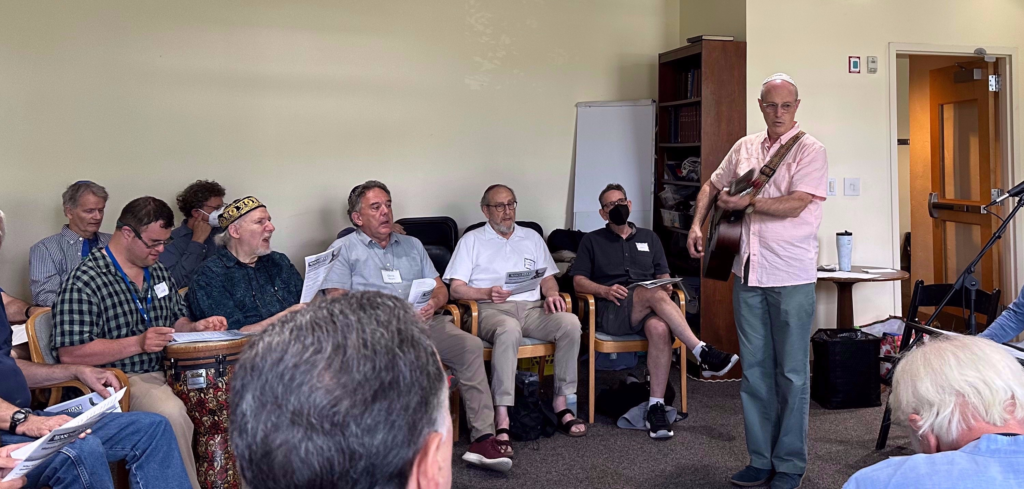
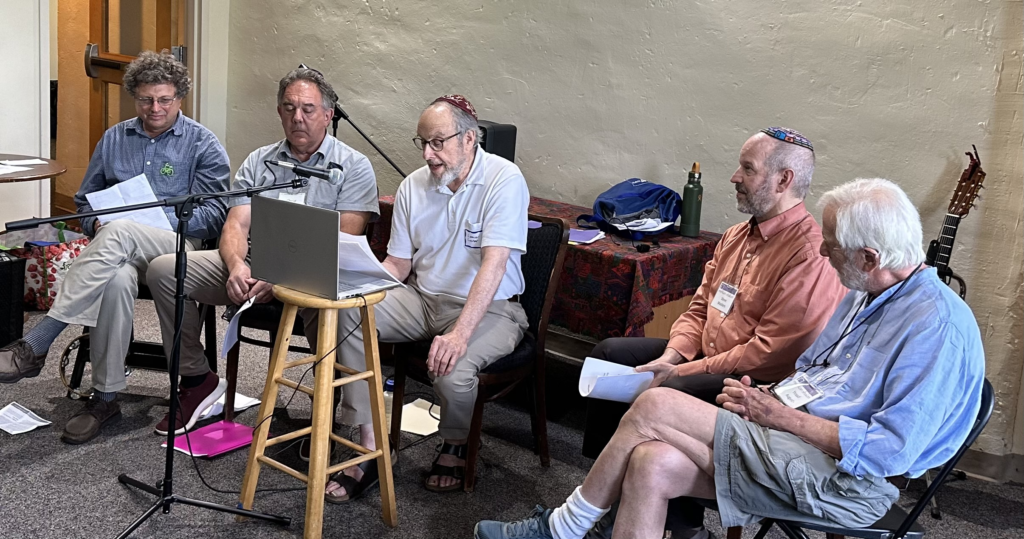
MenschGroup Meets For Their Annual In-Person Retreat Weekend
One of the five Mensch Groups organized by Menschwork held its annual in-person weekend retreat in upstate New York in February. The group spent the weekend cooking, sharing, hiking and relishing their time spent together. Members of the group include: David Reisman, Marc Jacobs, Boaz Kimelman, David Shaw, Ben Sherman, Eric Fleisch and Asaf Zilbering.


Two Words! A Life Lesson
A Dvar Torah by Rabbi Mark Biller
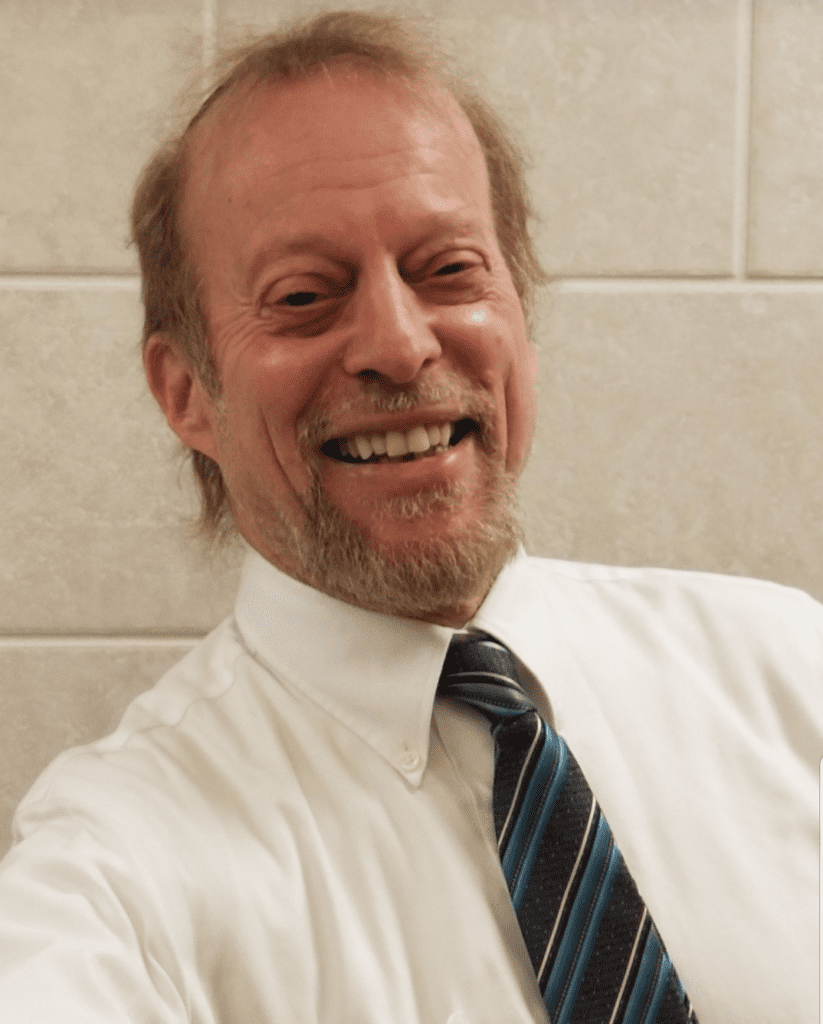
My earliest Torah memory goes back to being five years old. I was sitting in my first grade Hebrew Day School class. My teacher, Mr. Poulter, was a Holocaust survivor who spoke with an accent that I was getting used to. We turned to our first page of Chumash (Bible), and he read two words to us in Hebrew. I was becoming familiar with the new alphabet as well.
Turning to the thirty of us, he asked: “One of these words is extra! Why do you think it’s there?” Not only were we young people being treated like important scholars, but his intonation told us this search was important, and that it might bear lessons for us beyond these few simple-sounding words.
The moment was electric. As five-year-olds, we were beginning our search for meaning. Mr. Poulter was telling us that our Bible was more than meets the eye. This book might hold answers for us and our friends for the rest of our lives.
And what were the two words? Lech and Lecha. Lech meaning ‘go’; Lecha meaning ‘for yourself.’ As Mr. Poulter said, “The Torah didn’t need the whole phrase. “Why wouldn’t G-d just say to Abraham Lech – Go. Why did we need Lech Lecha – Go For Yourself?”
Travel, new learnings, changes in life – all are hard. Some part of us wants to dig in our heels and scream “NOT ME! I DON’T WANT ANY OF WHAT’S NEW!” Effective par-ents, teachers, nurses, therapists and travel agents understand this. The Torah knows and reminds us (through these two words) that every trip must be a ‘trip with-in’, that every change in our lives (whether they are thrust upon us or our choice) is a journey to somewhere inside us and blessedly holds the potential for our self-growth.
I’ve often thought of Mr. Poulter. Who isn’t on a journey to somewhere – a new physical space, a new relationship or just a new biological age-with the accompanying possibility of a new self-definition. These passages can strengthen us. The word Lecha-for yourself-reminds us that any newness can bring good and growth. Two Torah words. A lesson (for me) for a lifetime!

Marc Jacobs Reflects on the Joy of Two Years of MenchGroups

If you’re familiar with the magic that pervades the Jewish Men’s Retreat, then you won’t be surprised by the intensive, relational magic that develops between the brothers in our MenschGroups. Let me share with you some of what I’ve witnessed in these groups:
- A group discussed the topic of loss and discovered that several group members had lost their fathers at an early age. The knowledge that others had experienced the same sadness brought them consolation;
- Several men heard about MenschGroups and joined before they even attended a JMR weekend. They shared the isolation they felt in everyday life. Joining a MenschGroup has allowed them to connect with other Jewish men who share their values;
- A group that has met for 3 years has had annual in-person weekends at a member’s house. The sharing is deep and often lasts long into the night;
- Two men joined a group and used their life experiences to share and grow in the group. These two men have now become group facilitators;
- A physician spoke of the loneliness he felt given the demands of his profession. His involvement in MenschGroup has provided him with support and strength as he deals with helping patients cope with their life and death situations;
- Group members drew support from their brothers during all sorts of serious life events, including deaths, job loss, divorce, family estrangement, life threatening illnesses and other unexpected life challenges.
These are the blessings of brotherhood I’ve witnessed the last few years. What began as a series of facilitated drop-in groups started during the Covid epidemic in 2020 morphed into a successful program with five MenschGroups, seven facilitators, and thirty group members. Members include men who have attended the JMR, men who have never been to a JMR, and men who serve on our board, the Wisdom Council.
Creating the MenschGroup program and serving as a facilitator has enabled me to pay forward the gifts that other men have given me in my life. Hearing their stories and witnessing others listen intently brings me great pleasure. I know that these men will become kinder, gentler, and more compassionate when they deal with their families, communities, and work in the world. This is my Tikkun Olam. It brings me great joy and satisfaction.
If you’ve interested in joining one of our MenschGroups, please be in touch with me (Marc Jacobs) at: MenschGroups@menschwork.org. I look forward to discussing your participation.
Menschwork Launches the Alumni Advisory Council (AAC)
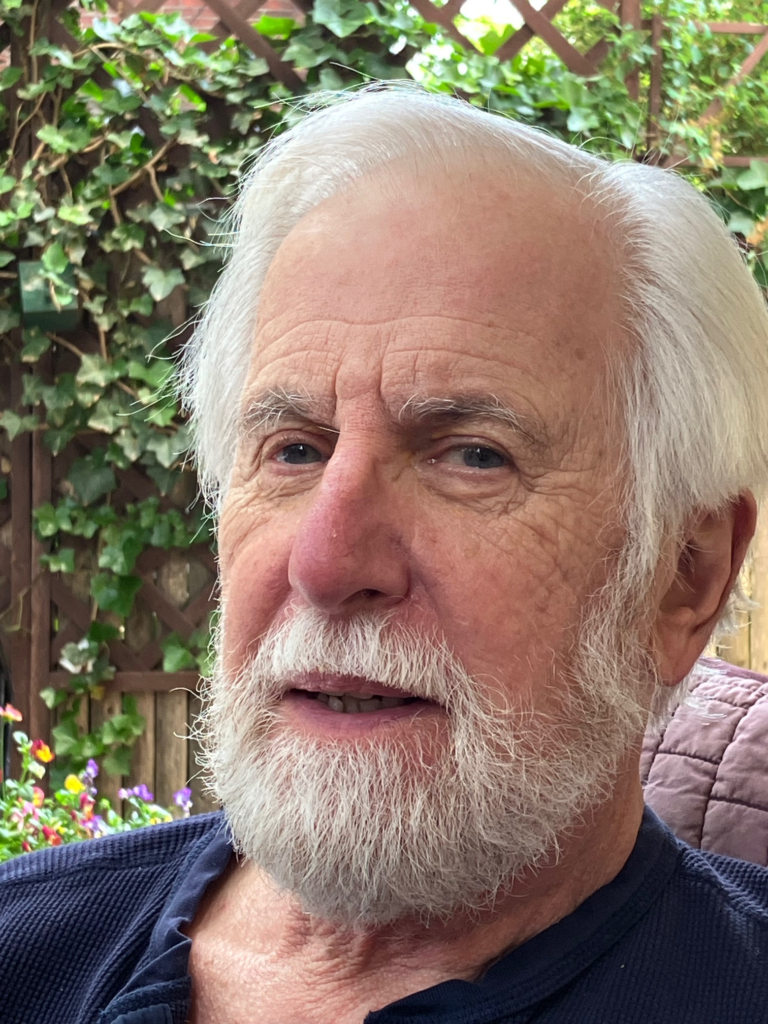
Over the past few years, an idea (originally suggested by Marty Pashelinsky) kept popping up at our Wisdom Council (WC) planning retreats to tap the wisdom and talent of former WC members. Many of those members were already contributing to Menschwork activities and we wanted to encourage more such engagement. Thus the Alumni Advisory Council (AAC) was born.
This year, thirteen former members of Menschwork’s WC stepped forward to create an opportunity for strengthening, deepening, sustaining and growing our Jewish men’s spiritual brotherhood. It will serve as an arm of the WC, offering advice and counsel as needed to the WC. AAC members will contribute ‘wisdom power’ rather than manpower, serving as strategic consultants. It’s wonderful and deeply satisfying for me to reconnect with brothers I’ve worked with over so many years of organizing and attending the JMR. Onwards, with love.
Our Alumni Advisory Council Members:
Harold Belkowitz – 2018-2022 (Washington, D.C.)
Ralph Benmergui – 2020-2021 (Toronto)
Mark Dwortzan – 2017-2019 (Greater Boston)
Michael Evers – 2020-2022 (Cincinnati)
Stuart Garber – 2008-2012 (New York City)
Donald Gardner – 2014-2018 (New York State)
Marc Jacobs – 2016-2022 (Philadelphia)
Marc Kronisch – 2020-2021 (Connecticut)
Elliott Myrowitz – 2008-2019 (Maryland)
Marty Pashelinsky – 2010-2018 (New York City)
David Piver – 2018-2020 (Philadelphia)
David Strauss – 2010-2013 (Greater Boston)
Cobi Waxman – 2014-2017, 2021 (Washington, D.C.)
I asked a number of AAC members to share why they joined the WC and why they are now saying yes to serving on the AAC. Here are their responses.

Michael Evers I had the privilege of joining the Wisdom Council after co-leading JMR28 with Ralph Benmergui and David Cherenson. Yosaif August approached me and asked if I’d join the WC. I said yes! Having attended my first JMR a few years before, I drank the proverbial ‘kool aid’ and enjoyed myself immensely. When Elliot Myrowitz called to ask me to join the AAC, I remembered how much I enjoyed and benefitted from being in this association of Jewish men.
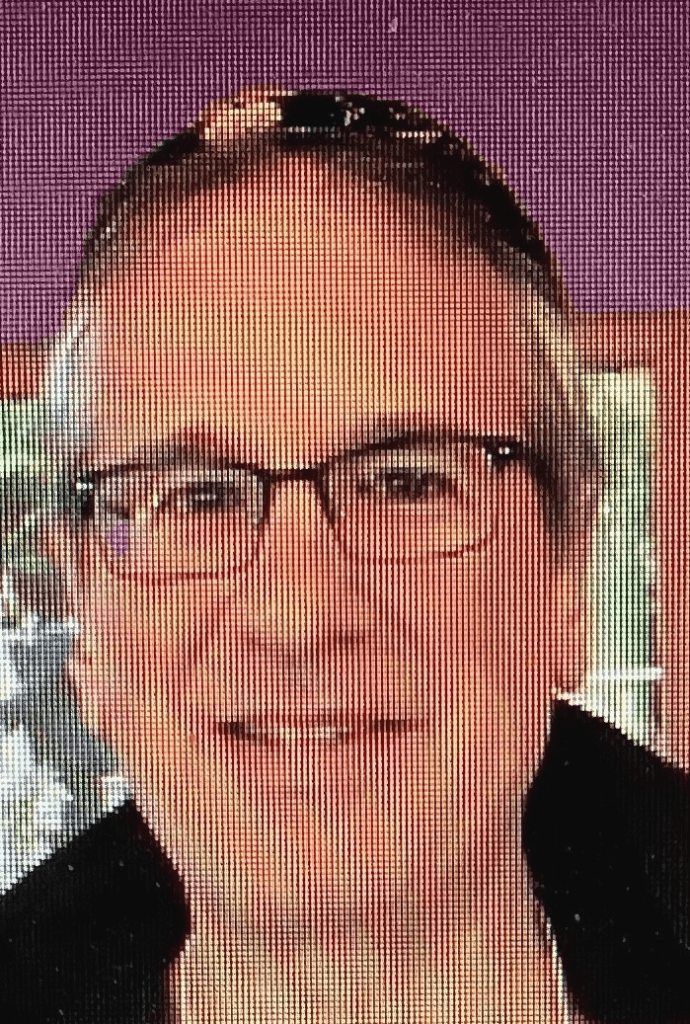
Mark Dwortzan I agreed to serve on the WC to help shape the future of the JMR and other Menschwork activities and to have the opportunity to spend time and collabor-ate with men who I respected and appreciated through attending many JMRs. I agreed to serve on the AAC to help Menschwork at a systemic level, and because it’s hard to say no to Donald Gardner!
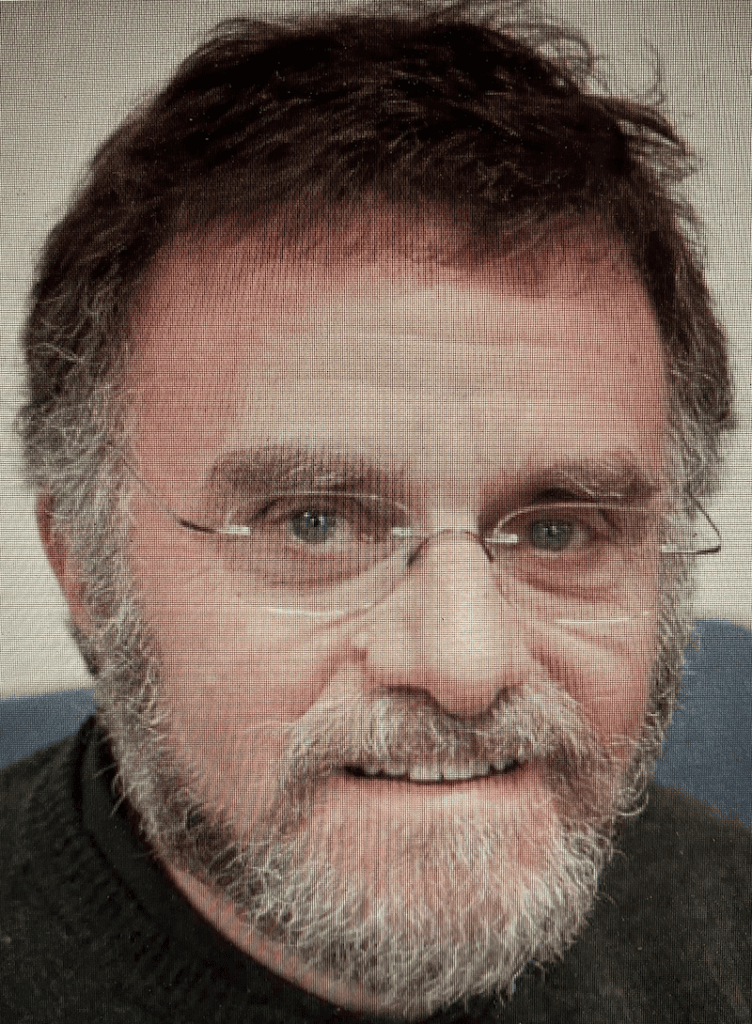
Donald Gardner I served on the Wisdom Council after attending many JMRs and serving on JMR planning teams. I want to help move our community forward in its mission. I was Chair of the WC when we created the non-profit, Menschwork, a huge step forward in helping us grow organizationally. The AAC can provide value-added to Menschwork by drawing on the Council’s expertise and experience.

Marty Pashelinsky After attending many JMRs, I saw an active, vital group that supported me so wonderfully, and I wanted to contribute my skills to the strategic direction of Menschwork. Mostly, I wanted to work with men whose vision and tenacity inspired me. When Yosaif invited me to join the AAC, I saw an opportunity to continue lending my talents to realizing Menschwork’s vision.
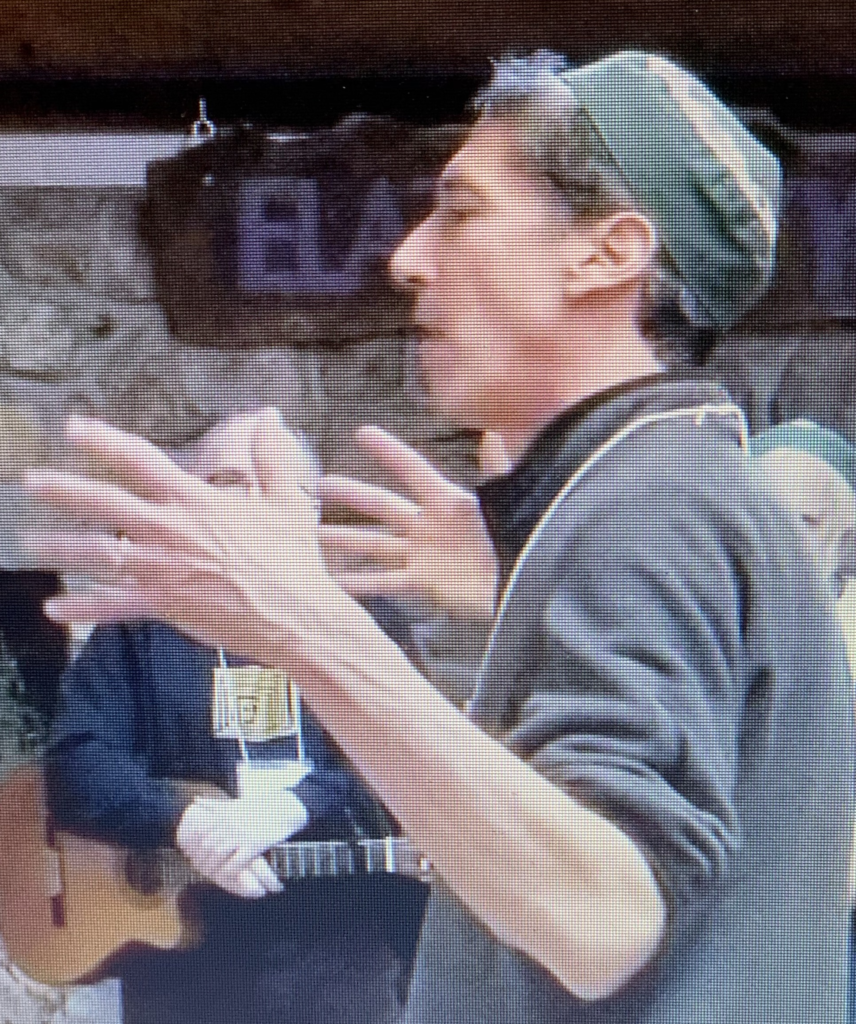
Elliott Myrowitz
It was an easy decision for me to say yes to joining the AAC. When I left the WC in 2019, I hoped that the next generation of leaders would continue deeply touching the lives of men and cultivating a close and extended community. And they have! They’ve shown integrity, sound judgment and wisdom in the process. When asked to join the AAC and contribute to growing Menschwork, it was easy to strongly say yes.
JMR33 Planning Team Update
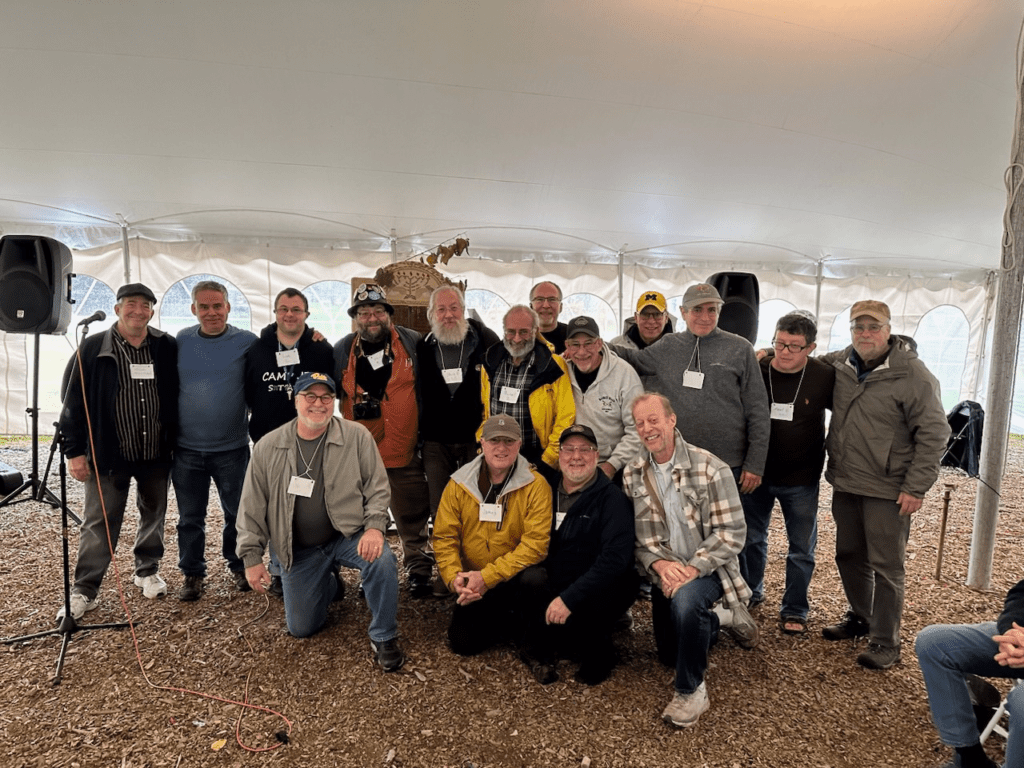
Kneeling (L to R): Roger Zimmerman, James Wertheimer, Michael Landau, Reb Mark Biller. Standing (L to R): Josh Millman, Simon Olsberg, Lior Liebling, , Phil Wachsler, David Reisman, Michael Zimmer, Reb Shawn Zevit, Marc Jacobs, Harvey Freedenberg, Les Fagen, Assaf Zilbering, Joel Ackelsberg
Not in photo: Harold Belkowitz
REALIZING MY JEWISH JOURNEY
As the co-chairs of JMR33, our goal is creating a weekend journey that offers a new lens on our parsha, Lech Lecha. As we contemplated Avram/Avraham’s journey in the parsha, we became especially intrigued by his own spiritual development rather than the specific details of the journey. Consider some of the questions we asked ourselves:
What about my own spiritual journey beyond my education, work history, and accomplishments?
How did I arrive to where I am in that journey? In what direction do I need to go from here-in the same direction or an entirely new one?
How do I move in that desired direction and what help/guidance/support do I need from my family and my communities to get there?
It was from these questions that our weekend theme emerged- Realizing Our Jewish Journey.
Our intention is to develop a rich and spirited weekend that develops this theme in the fullest sense of the word – intellectually, spiritually, and physically. Realizing Our Jewish Journey is about honestly and openly telling our story about how we arrived at this point in our journey. In doing so, we learn about ourselves in unexpected ways while having our brothers bear witness to our ‘telling the tale.’ To give attendees the opportunity to understand and develop their ‘telling the tale’ skill, we have invited a master storyteller to guide us. We will honor each of our journeys, appreciating the process of telling our stories and listening to others with an open and appreciative heart.
The theme and activities are now being woven together. We are also building in more free time, more music, and more opportunities to informally meet new brothers. We are fine tuning the logistics at the Pearlstone Retreat Center based on Menschwork’s first experience there for JMR31. These include:
- A streamlined registration process, with everything available in a single envelope.
- Afterhour lounges, stocked with snacks and beverages, available 24 hours a day, for informal meetings or opportunities for jam sessions.
- Private rooms where our Mishpacha Groups will meet.
- A well-illuminated bonfire area with comfortable seating and a microphone.
- Sunday mealtimes adjusted to maximize programming.
Finally, we want you to know that we read your JMR32 survey responses carefully and have used your comments and suggestions to improve this year’s overall JMR experience. So please, fill out the surveys after JMR33! We need to hear from you.
Josh Millman, Harold Belkowitz, and Roger Zimmerman
WHAT: 33rd Annual Jewish Men’s Retreat
WHERE: Pearlstone Retreat Center, Reisterstown, Maryland
WHEN: November 8-10, 2024
It’s Time To Register for JMR33!
Join Other Brothers and Reserve Your Space Now
Meet Your Menschwork Wisdom Council
We want the Menschwork community to meet the men serving on the Wisdom Council (WC), the governing body that oversees all Menschwork matters and ensures that the JMR planning team has everything it needs.
For this issue of Brotherkeeper, meet Harry Scheyer

AS: Harry, how did you first learn about the JMR?
HS: I was introduced to the JMR by Yosaif August, a fellow member of the Life Planning Network (LPN), a national non-profit focused on supporting baby boomers. As I transitioned from my financial life planning practice career, I sought meaningful communities and found a welcoming one at JMR28 in 2019.
AS: What’s been your experience attending the JMR?
HS: When I started my transition from my work life, I knew I needed to find some meaningful communities that would help replace the one I was leaving. I dearly valued my work as a financial planner, and with my partner we established a highly regarded regional practice for over 25 years. I took Yosaif’s suggestion to attend the JMR. After attending my first retreat and feeling very welcomed, I knew that this was a community that I wanted to be part of. JMR has been a wonderful fit, providing connection and support as I navigated my new stage of life. I’ve attended four consecutive retreats, including JMR32 in 2023. I have certainly learned a lot and boosted my much-needed spiritual life dimension.
AS: How did you get involved in the planning team and the Wisdom Council?
HS: After attending JMR28 and 29, I knew I wanted to get involved with organizing and planning JMR30 in October 2021. Because of my involvement with the planning team, I was fortunate to be asked to join the Wisdom Council. I was honored to be chosen to serve and to become an active member of this group.
AS: What do you appreciate about being on the Wisdom Council?
HS: I appreciate very much the additional time I get to spend with Wisdom Council members and the relationship building opportunities that come with collaborating with them on our activities. Also, like serving on any board of directors, I feel a real commitment and responsibility to applying my life long experiences to support this Jewish-centered organization whose mission resonates deeply with me.
AS: Tell us about yourself?
HS: I’m in my mid-70s, married for over 50 years, with three adult children and four grandchildren. I remain active on the Rowan University Foundation and Innovation Venture Fund boards. I enjoy spending time with family, playing chess and backgammon, music, and wintering in Florida. As the second generation son of Holocaust survivor parents, I was fortunate to observe and admire their strength and resilience and to learn from them to be grateful and enjoy life to the fullest. These values have profoundly shaped my life and continue to inspire our family. I have also been active in my local Chabad community congregation that is led by an exceptional and joyful Rabbi and his family.
Artists Among Us
BROTHERKEEPER Online Magazine features the artistic talents of our brothers, be it prose, poetry, music, artwork or other creative expressions. If you have artwork (in any medium) you’d like us to show, please send an email to: allenmspi@theothermanofsteel.com.
Boaz Kimelman

I live in New Jersey, am married to my wife, Jill, and have two sons, Atid and Josh, both of whom have attended the JMR. I was born in Jerusalem and after serving in the Israeli Air Force, I relocated to the United States in 1981 to study graphic design, first at the Art Institute of Boston and then at The School of Visual Arts in New York City, where I received a BFA degree.
For over two decades I’ve led creative teams performing groundbreaking branding, marketing and fashion graphics for companies like DKNY Jeans, Disney, Warner Bros., M&M, GM, The Andy Warhol Foundation, JKL (Matthew McConaughey), Nautica and Coca-Cola, to name a few.
I’ve lived in the United States for over 30 years and have remained passionate about and connected to Israel in a deep and profound way. In 2013, I found the newest iteration of my ‘artistic voice’ by creating a company, Wordplay, where I create artwork that uses Hebrew letters and words. I’m able to make Judaica art that is unique and whimsical, bringing designs to life that are fresh and new while, at the same time, practical.
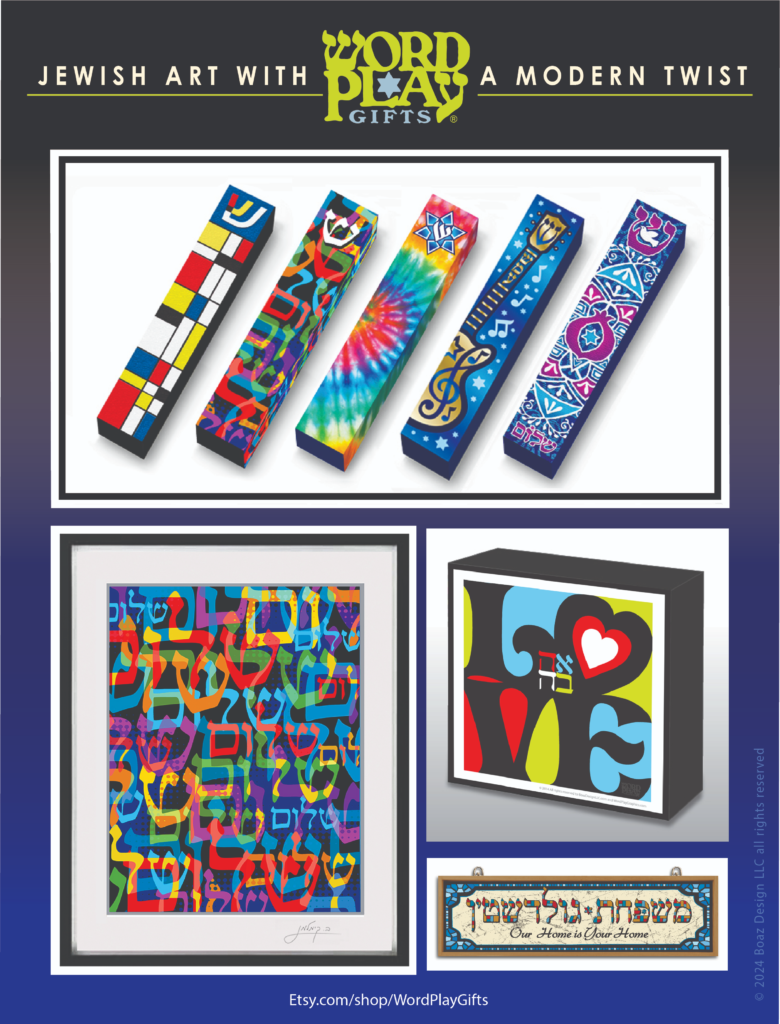
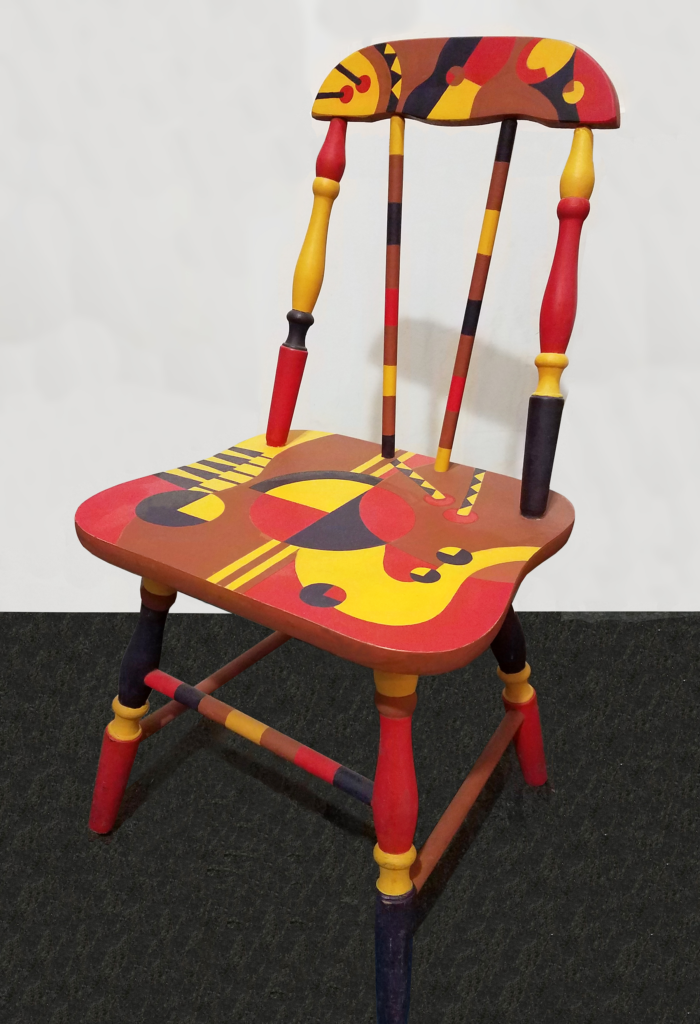
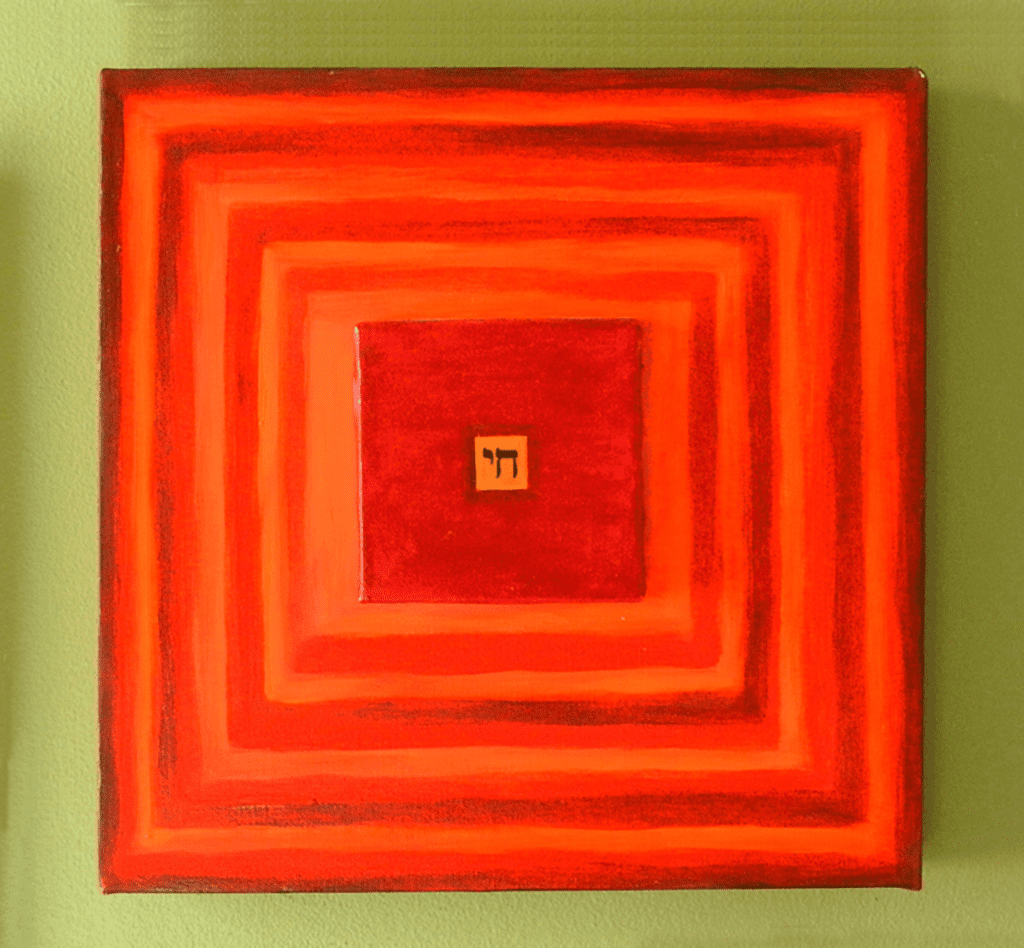
Louis Gippetti
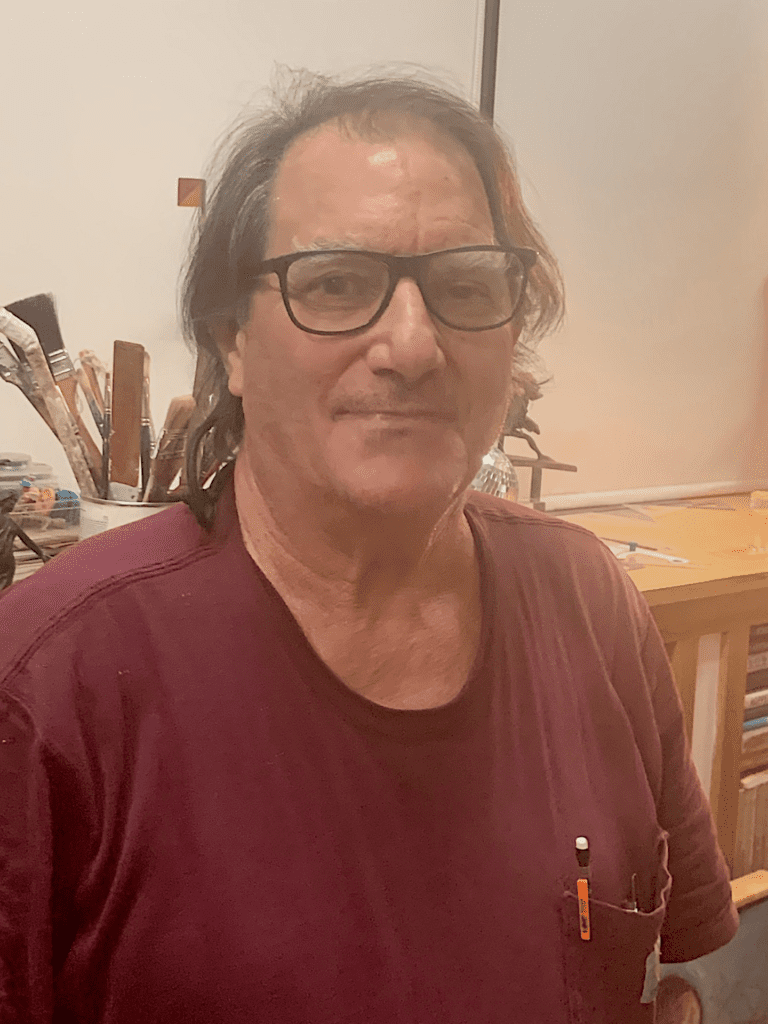
I was first introduced to the men’s group at Temple Beth Zion (TBZ) in Brookline MA by Allen Spivack about four years ago. It has been a unique experience to talk with other men about my personal issues without feeling self-conscious. The Men’s Group helped me to feel more confident and freer to express myself. I was encouraged to attend my first JMR in 2021 and doing so strengthened my embrace of life and connections with others. I look forward to attending the 2024 retreat.
Although I’ve participated in TBZ services and events for many years, I was not ‘officially’ Jewish, although I had always been attracted to Judaism. My late wife and our two children are Jewish. In June 2023, I completed all requirements for conversion to Judaism and had my official conversion ceremony at the local mikvah.
Visual expression has been a motivator for me all of my life. I have been drawing since I was a child as I found that I felt successful using visual expression. I attended college at The School of Visual Arts in New York City and then obtained my MFA in Painting at the Yale University School of Art. My subject of choice then, as it is today, is portraiture and the human form, and my medium of choice is oil paint. I have continued oil painting throughout my career.
When I moved to Boston in 1972, I started to teach drawing and painting inform-ally. I later taught oil painting at the Museum School of the Museum of Fine Arts for 27 years. Since I retired from teaching, I have been able to devote myself full-time to painting.



Alan Harris

I was born and raised in Worcester, MA and grew up in a conservative shul. I was away from organized religion for 12 years. I had been the Ba’al Tekiah (Master of the Shofar) at this same synagogue for about 25 years. I’m slowly but surely studying on my own and also studying in chevruta (with a study partner). My first introduction to Menschwork was at the 2023 JMR which Bill Magaliff told me about. This is one of the first poems I’ve ever written. I wrote it for our Brotherhood Shabbat in May 2024.
Brotherhood To The Test in 2024
We are Human Beings, we are Brothers.
We are children of Abraham, we are Brothers.
We share the same land, we are Brothers.
We share the same land, whether we want to or not, we are Brothers.
We are brothers, whether we want to be or not.
If we live on this Earth, we are Brothers.
We talk to each other, we are Brothers.
We have to talk with each other, we have no choice, as Brothers.
But, do we listen to each other, as Brothers?
Do we hear each other, as Brothers?
Do we silence our inner thoughts in order to listen, to hear, our Brothers?
Or do we talk in our heads the answers we think our brothers want us to say?
We get angry, like brothers.
We let our anger overtake us, like brothers.
Sometimes, we stop talking and communicating with each other, like brothers. Sometimes?
Sometimes we refuse to talk with each other, like brothers. Sometimes?
But, Brothers, is war the answer?
War is easy, just shoot, shoot, shoot and bomb bomb and bomb away.
Learning how to talk and listen, really listen, is hard work, my Brothers.
Especially when you’ve been at war with each for so long.
Saying Peace is easy. Working peace, that’s another question.
The day is short and the work is great.
Let’s get started, my Brothers!
A Blast from the (JMR) Past!
S
Simon Olsberg and Allen Spivack attended a concert at Brandeis University in April performed by Yoni Battit and his band. They were delighted to see each other after this spirited event.

A group of JMR brothers toured the Studio Without Walls Sculpture Show in Brookline MA in June. Standing in front of Allen Spivack’s sculpture, Cathedral of 28 Secrets, are (L to R): David Rothberg, Ammi Kohn, Robert Kaim, David Neiman and Ira Spool.
And A Final Word About Mensches…
(Thank you to Elliott Myrowitz for sending this to the Editors) By JACK WILINSKY of The Jewish Standard (February 16, 2012)
In the February 10, 2012 issue of The Jewish Standard, Bernard Roth stated in a letter to the Standard that there is no such word as “mensches” in German or Yiddish. Roth is correct-there is no such word in German or Yiddish. There is such a word in English. There are two correct plurals of “mensch” in English: “menschen” and “mensches.” Furthermore, since “mensch” in German and Yiddish means a ‘person’ or ‘human being,’ it means something entirely different in English-‘a very decent, good person.’ For this reason, the word ‘mensches’ (as used by The Jewish Standard) should be considered entirely an English word, as the plural for ‘mensch.’
Editor’s Note
Menschwork wants to reach out to our community with more communications about our activities and Wisdom Council operations. If your community is having events, take some photos and send them to us. If you would like to write an article about your JMR experience or a related topic, please send an email to: allenmspi@theothermanofsteel.com
Online Magazine Editors:
Allen Spivack and Yosaif August

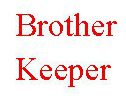
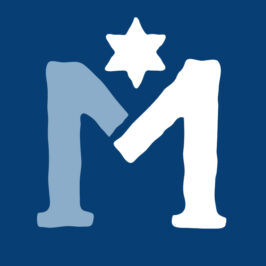
Leave a Reply
You must be logged in to post a comment.